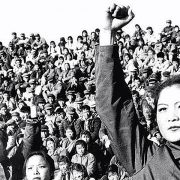Speech by Revolutionaire Eenheid activist at ORCC Amsterdam
Revolutionaire Eenheid, which describes itself as an anti-capitalist, anti-imperialist, proletarian and feminist organization, actively participated in the recently concluded October Revolution Centennial Conference on 23-24 September in Amsterdam. A member activist, comrade Susana Perez, delivered an inspiring speech focused on the lessons of the Great Proletariat Cultural Revolution in relation to the current “challenges amongst modern youth movements.” The full text of her speech follows:
Lessons from the Great Proletariat Cultural Revolution on Modern Revisionism
Hello, goede morgen. My name is Susana and I am speaking on behalf of Revolutionaire Eenheid (RE) in Amsterdam. I’m originally from Caracas, Venezuela but I have been involved mostly in U.S-based student organizing around Palestinian solidarity.
I would like to thank all of you for joining us in celebrating the tremendous achievements sparked through the October Revolution. As an assertion of the humanity’s will, we gather to commemorate, reflect and apply the strategies derived in the process of the revolution. Under the same spirit, as a part of today’s panel, I will be focusing on the lessons of the Great Proletariat Cultural Revolution in relation to the following challenges amongst modern youth movements:
- Petty-bourgeois sectarianism
- Liberal Identity Politics and Intellectualism
Although we, as committed communists, agree with the premise of modern movements which seek to advance the fight for human emancipation, it is of crucial importance to carry this out with a scientific praxis.

Comrade Susana of Revolutionaire Eenheid delivers her intervention at the October Revolution Centennial Conference in Amsterdam, 24 Sept 2017.
As a member of several student and youth organizations, I constantly encounter and grapple with these two issues in practice. Yet, these criticisms are not to undermine the potential of my fellow comrades. On the contrary, history has taught us that some of the greatest uprisings have been instigated by young students. Take the first dazibao (big-character poster) put up at the Beijing University on the 25th of May 1966. The poster put up by Nie Yuanzi, a philosophy academic, who decided to make a public criticism about the administrator’s devotion in protecting the bourgeois educational order. Her rebellious attitude was well received by the local high school and university students and as a result, she inspired the formation of the first Red Guards. Consequent formations across China mobilized millions under the same revolutionary goal as Chairman Mao claimed; “to struggle against and crush those persons taking the capitalist road”. Red Guards grew so rapidly in mass that only 3 months later, the Party was pushed into officially endorsing their initiative, the Great Proletariat Cultural Revolution. These millions of Red Guards were the leaders in manifesting social disorder against the ruling class. A break from the old world. Unlike other sectors of society, young people are not jaded but are optimistic and thus, they have the sharpest weapon of all: the revolutionary spirit. With that in mind, I hope to demonstrate how modern revisionism is rooted in the same intellectual elitism and reactionary characteristics the Red Guards sought to smash.
Firstly, we must look not further than our own universities to find administrative corporate loyalty and rotten ideological indoctrination.The role of our schools is to make sure students internalize the institutional right-wing mentality. From illusions of individualist self-achievement to the explicit imperialist lies, our universities seek to produce a generation that will always honor capital’s dictatorship. This is dehumanization to its very core. They pit people against each other as they feed the mouths of rich pigs. How can we fight this? The mass line.
Young people during the Cultural Revolution were sent to the countryside to learn from peasants and workers. Young [city] student Xiu-ying worked restless for several days and nights [in the fields]. She thought to herself; “Why is it that the old poor peasants think of the production team at every turn while I think only of myself?”. Her reflections place the ego below serving the masses wholly and entirely. Petty-bourgeois sectarianism produces class superiority between the workers and youth. When we don’t center the necessities and demands of workers, we will fail in overthrowing capitalism.
The battles of the proletariat are difficult struggles but as Chairman Mao said: Be resolute, fear no sacrifice and surmount every difficulty to win victory. This means we must fight the revisionist politics of institutional reformism and NGO voluntourism. Community organizing means being re-educated by the masses instead of honoring academia and decaying egos. When we pass a Boycott-Divest-Sanctions bill denouncing Israeli terror, when we demand respect for campus workers, when we demand an end to document checks, the university will always be there to shut us down. We must not be discouraged, we must fight aggressively alongside the international working class. Criticize the self-interested traitors, the masses are the real heroes.
Secondly, the revisionist camp is also composed of liberal identity politics and intellectualist groups. In my college, we will perpetually hear the mouth service of ‘intersectionality’ by my fellow students. Intersectionality is a method of analysis but not a praxis. We are taught to use this word but this is not going to change society. Theorizing about our problems is useful but not when this in the confines of academia. Intersectionality along with other identity-based approaches separates capitalism from the material basis of oppression.
Thanks to Comrade Jiang Qing, the revolutionary cultural influencer (also Mao’s wife), proletariat feminism was integrated into the revolution. She wrote several operas and plays which were able to place women’s liberation at the forefront of the movement. Illustrated in “The Red Detachment of Women”, a ballet which tells real accounts of Chinese peasant women in Hainan who join a women’s Red Army faction. The opera depicts a young woman who liberates herself from her brutal landlord master and joins in army’s fight to liberate the local peasantry.
Jiang Qing’s works teaches us that women’s self-determination, as any oppressed group, must be active and visible in every facet of the revolution. Proletarian feminism does not divorce class struggle from the fight of patriarchy. Modern revisionists will advocate against racism, sexism, homophobia (etc) through inclusionary narratives of rights and reform which remain compatible with capitalism. This is the dialectic. The totalizing effect of capitalism that exploits across divisions of oppression are also the sites of unified resistance. We must seize this commonality instead of allowing the opportunists to advocate for imperialism under the guise of ‘so-called progress’ (we see this in people such as Hillary Clinton and Obama). This is why our anti-racist and feminist practice should always be anti-imperialist and not liberal. Only unity against the common enemy will allow us to achieve our goal.
To sum up, the Chinese youth have demonstrated the importance of practicing the mass line and proletarian feminism in combating current reactionary trends of liberalism. Chairman Mao Zedong spoke to the great potential and sphere influence held by revolutionary youth. I always meditate on the quote from a meeting with Chinese students in Moscow; “The world is yours, as well as ours, but in the last analysis, it is yours. You young people, full of vigor and vitality, are in the bloom of life, like the sun at eight or nine in the morning. Our hope is placed on you. The world belongs to you.” So with that I say, pa’lante compas, kasamas and comrades!






Leave a Reply
Want to join the discussion?Feel free to contribute!